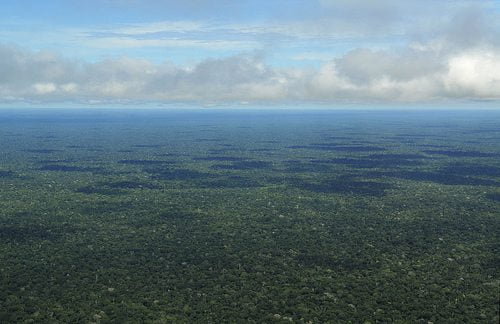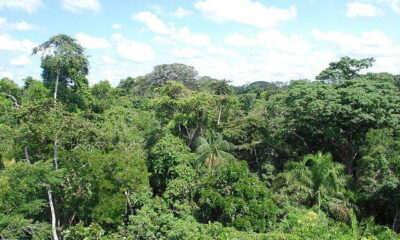

Economy
New Analysis Reveals Substantial Economic Benefits of Securing Community Rights to Rainforests in Brazil and Guatemala
Study Finds Modest Investments to Ensure Forest Rights for Indigenous People and Communities Will Avert 5.4 Billion Tons of Carbon Dioxide Emissions.
The relatively modest investments needed to secure the forest rights of Indigenous Peoples and local communities will generate significant returns—economically, socially and environmentally—according to new research by the World Resources Institute (WRI).
The working paper, The Economic Costs and Benefits of Securing Community Forest Tenure: Evidence from Brazil and Guatemala, finds that one of the biggest impacts is in global benefits realized through avoided CO2 emissions from deforestation.
For the two areas studied in Brazil and Guatemala, secure rights to community forests are expected to prevent the release of over 5.4 billion tons of CO2 over 20 years—equal to the emissions of more than one billion cars in a year.
“Secure rights in community forests of Brazil and Guatemala are a positive investment for both countries, which carries important implications for many other countries,” said Erin Gray, an economist at WRI and lead author of the paper. “Similar investments would provide government officials, climate negotiators and donor agencies the opportunity to pursue a cost-effective and powerful climate change mitigation strategy.”
Across the Indigenous Territories in the Brazilian Amazon, which cover 13 percent of the country, the benefits from carbon capture and averted emissions amount to $161.7 billion over 20 years. In the much smaller Community Forest Concessions of Guatemala’s Maya Biosphere Reserve, the benefits amount to $605 million over the same period.
“The global implications are huge,” said Juan-Carlos Altamirano, economist at WRI and report co-author. “Indigenous Peoples and communities have some legal rights to about one-eighth of the world’s forests although they actually hold and use much more under customary arrangements. When we invest in strengthening their rights, we now know we are not only doing the right thing, we are also making a smart investment in a more climate-stable world.”
Previous WRI research has shown that community forest rights that are legally recognized and protected by governments often translate into healthy forests with high forest carbon storage, and reduced deforestation. But achieving secure rights requires investments to strengthen legal protections and ensure their implementation, as well as to strengthen the capacity of local people to sustainably manage and benefit from forest resources.
WRI’s new analysis finds that the estimated annual costs per hectare of securing community forest tenure are low compared to the benefits from reducing carbon emissions and avoided deforestation. In Brazil, a US $19 per hectare investment today, would yield the equivalent of US $1,473 in benefits in 20 years. In Guatemala, a US $63 investment today, would yield US $1,899 in benefits. In Guatemala, the calculation includes economic benefits to communities through sustainably harvesting and marketing forest products.
In addition to carbon storage, secure community forest rights are known to produce a suite of other economic, social and environmental benefits, including reduced conflict, improved biodiversity and water regulation, increased job creation, reinvestment in local communities, and reduced out-migration, as well as avoided deforestation.
The working paper suggests that the development of such methods will ultimately demonstrate even higher net benefits of secure rights to community forests.
“This paper sheds important new light on the multiple benefits of securing land rights,” said Peter Veit, Director, Land and Resource Rights Initiative, WRI. “However, it’s clear that further research is needed to more fully understand the economic benefits. We expect that as we expand our understanding of this issue, decision makers will take more actions to strengthen community land rights.”
For more information click here.


 Environment12 months ago
Environment12 months agoAre Polymer Banknotes: an Eco-Friendly Trend or a Groundswell?

 Features11 months ago
Features11 months agoEco-Friendly Cryptocurrencies: Sustainable Investment Choices

 Features12 months ago
Features12 months agoEco-Friendly Crypto Traders Must Find the Right Exchange

 Energy11 months ago
Energy11 months agoThe Growing Role of Solar Panels in Ireland’s Energy Future




























